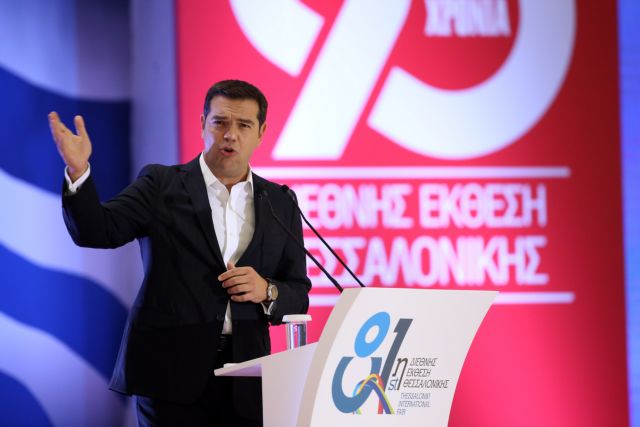The Prime Minister Alexis Tsipras gave a press conference at the Thessaloniki International Fair (TIF), where underlined the need for political stability in Greece.
In response to main opposition leader Kyriakos Mitsotakis’ repeated call for elections, the PM commented that the ND leader was still betting on a ‘left interlude’ instead of supporting the country, which he said needed stability and not elections at this time.
During the press conference the PM stressed how Greece was an “oasis of stability” within a larger destabilized region, with little to gain by bringing elections forward.
Commenting on the public debt, PM Tsipras explained that “it is a problem that has an international dimension, because the solution to this problem will play a decisive role for growth in the European economy, which in turn determines the global economy”, he said, adding that there was no disagreement with Germany.
Germany believes that rules must be followed and Greece was doing this, but expected its partners to do likewise, the PM said. He noted that the reforms carried out by Greece were “a pleasant surprise” and that the conclusion of the first review amounted to 75% of the Greek program.
“We have not reaped any results due to the Germany-IMF dispute” PM Tsipras pointed out, adding that political developments in a single country could not act as an obstacle to the changes that Europe needs. Referring to the prior actions that were still pending for the conclusion of the review and a full disbursement of the first tranche of loans, he said these were primarily of a technical nature.
With respect to the second bailout program review, PM Tsipras said the outstanding prior actions were largely technical and that Greece intends to push forward and finish implementing the agreements.
Questioned on the primary surplus targets and creditor refusal to reevaluated them, PM Tsipras noted explained the surplus targets after 2018 would depend on the decisions taken for Greece’s debt on a European and international level. He appeared confident that negotiating lower surpluses was feasible, however, and said the government will aim to do just that.
“If after 2018 we have the option of smaller surpluses, we will have a fiscal space of 3 billion euros”, he noted, adding that he will come to TIF as Prime Minister in two years time to outline how this will be allocated. The main goal will be to ease the tax burden on businesses, gradually introduce a fairer property tax and take steps to support the weak in society, as well as education and health.
The Prime Minister outlined his plans to turn Greece into an energy hub in the region, noting that the construction of the Trans-Adriatic Pipeline (TAP) had largely achieved this goal. “To the degree that there are other pipelines at our borders, we will be quick to welcome them in the framework of EU treaties and the rules of free competition” he added, saying talks were already underway with Italy and a deal already set up between Greece’s DEPA, Russia’s Gazprom and an Italian firm.
In relation to the ongoing case against the former ELSTAT chief Andreas Georgiou, and the allegations that he artificially inflated the official estimates on Greece’s 2009, PM Tsipras pointed out that the fallout concerning ELSTAT’s divs in 2009 primarily concerned New Democracy and PASOK, which were in power at the time. He underlined, however, that Greek justice was independent and that the investigation will be carried out in depth, to shed light on what actually happened.
Commenting on the migration and refugee crisis, the Greek Premier asked the country’s European partners to speed up implementation of the EU-Turkey agreement with respect to resettlement of refugees, and argued that Turkey had largely kept its end of the bargain, giving Greece some much-needed respite.
Talking about privatizations, Tsipras said the government has tried to avoid a “fire sale” mentality and better defend the public interest, while acting within the framework laid out by the agreement. Revenue from privatizations has gone towards paying the public debt, noting that the government has been ‘successful’ in the cases of COSCO and Elliniko, adding that the privatization of the Thessaloniki port will come next.
Asked about the recent pension reforms, the Prime Minister pointed out that 90% of pensioners had not seen any main pension reductions, despite the opposition’s complaints, and that only 5% suffered drastic reductions, while 10% had seen a small reduction.
The Prime Minister was also quizzed about the recent developments in the media, following the television license tender. PM Tsipras pledged to provide incentives to protect jobs in the television stations that did not receive a nationwide broadcasting license and said the revenue raised by the relevant tender was “unexpected” and will be spent on unscheduled actions.





